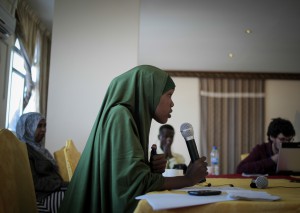Legal and institutional frameworks

Appropriate legal and institutional frameworks are of paramount importance to the realization of the right to social security.
An appropriate legal framework establishes entitlements in a clear and transparent way, and will allow persons who are entitled to benefits to make claims and obtain redress in case of a violation of their rights. It will also protect people from arbitrary or discretionary selection and decision making facilitate access to social protection and help guaranteeing equality of treatment.
Legal and institutional frameworks are also essential for establishing the roles and responsibilities of the different actors involved in designing, administering, delivering, and enforcing social protection systems. It is therefore essential to the effective functioning of the system and serves to avoid overlaps, duplications, multiplications or gaps.
Photo credit: “2013_10_09_Media_Law_Consultation_027” by AMISOM Public Information (CCBY 2.0 via Flickr).
The Compatibility between ILO Recommendation 202 on Social Protection Floors and the ICESCR
It is undeniably relevant to consider the compatibility of the International Labour Organization’s (ILO) Recommendation No. 202 and the International Covenant on Economic, Social and Cultural Rights (ICESCR), given that the ICESRC is very demanding, covering not only social security and its main nine branches, but also questions like work and working conditions, education, food, […]
Using Human Rights in the Courts to Broaden Social Protection—The South African Example
Human rights have an important role to play in supporting the objectives of social protection which include the prevention of poverty and inequality, ensuring solidarity and inclusion, and creating economically and socially fairer societies. They offer a normative basis and a legal imperative for requiring that states realize the right to social security for their […]
Social Security (Minimum Standards) Convention, 1952 (No. 102)
A reference for the development of social security systems, Convention No. 102 is the flagship of the up-to-date social security Conventions since it is deemed to embody the internationally accepted definition of the very principle of social security. Convention No. 102 is unique for both its conceptual formulation of social security, and the guidance it provides for […]
Social Protection Floors Recommendation, 2012 (No. 202)
Recommendation No. 202 is the first international instrument to offer guidance to countries to close social security gaps and progressively achieve universal protection through the establishment and maintenance of comprehensive social security systems. To this aim, the Recommendation calls for (1) the implementation, as a priority, of social protection floors (SPF) as a fundamental element […]
Toolkit on ILO Social Security Standards
The Toolkit on ILO Social Security Standards was developed with the aim of raising awareness about ILO social security standards and promoting their ratification as well as increasing their impact and application in national contexts. The toolkit provides very practical and useful insights as to the ratification procedure, model instruments of ratification as well as […]
Building Social Protection Systems: international standards and human rights instruments
This compendium contains a selection of the most relevant international instruments that establish the human right to social security and provide guidance for comprehensive social security systems at national level. These include the standards and conclusions adopted by the International Labour Organization (hereinafter referred to as ILO) in the field of social security and the […]
Extending Social Security by Anchoring Rights in Law
The South African social protection system is one of the most comprehensive within the region. Its statutory and effective coverage rates are above the region’s average and comparable or even beyond those of other BRICS countries. The comprehensive nature of the system lies in contributory and non-contributory cash and in-kind legal guarantees which form the […]
Extending Social Protection by Anchoring Rights in Law
The adoption of the 1988 constitution marked a landmark in the history of the Brazilian social security system by introducing a universal social security model grounded in citizenship rights. The Constitution sets out the State’s responsibility in organizing and legislating social security. This should be done according to principles of universality of protection, adequacy of […]

